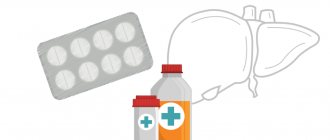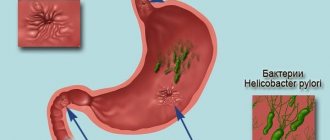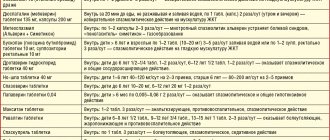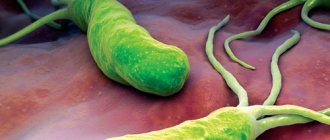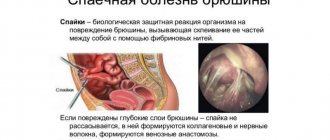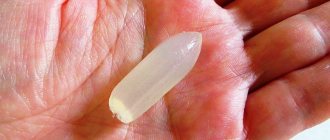Summer time is a wonderful time to travel to various resorts. Seaside resorts are especially beneficial, where not only children, but also adults improve their health. Clean air and salty sea water have a beneficial effect on the body. But before the trip, it is better to protect yourself from various kinds of diseases, because adaptation to a new climate and water is not always smooth sailing. Thus, prevention of intestinal infections before going to sea is the most important activity for every person.
Related articles:
Intestinal infection in adults - what antibiotics to take? Intestinal infection: symptoms and proper treatment in adults About the symptoms and treatment of rotavirus intestinal infection We treat an intestinal infection in a child quickly and easily Diet for intestinal infection - what is possible if you have an illness
How is intestinal infection transmitted?
Infection occurs when a pathogenic virus or bacteria enters the child’s body, namely, into the gastrointestinal tract. Most often, infection occurs in the following ways:
- when communicating with an infected person, the disease is transmitted by airborne droplets and through dishes, dirty hands, toys and household items;
- through low-quality food products;
- through contaminated water containing pathogens.
There are cases where children with weakened immune systems were infected with opportunistic bacteria living inside the body, without any external influence. But still, most often, morbidity is caused by non-compliance with the rules of personal hygiene and unsatisfactory sanitary and hygienic conditions at home, in kindergarten and school.
Incubation period
A child who has had a viral infection remains a carrier of the virus and a source of infection for others for two to four weeks after recovery. And with bacterial infections, the child is a source of infection only for a few days after the disease has subsided.
Symptoms of intestinal infection in children
Some symptoms of gastrointestinal infections are very similar to ARVI. In many children, the onset of infection occurs as a cold. There is an increase in temperature, signs of rhinitis, cough, sore throat. A few days later, signs of acute intestinal disorder are added to the symptoms of flu.
| Symptom of the disease | Characteristics of the symptom |
| General intoxication | Newborn babies become lethargic, their activity decreases, they refuse to eat, and they cry for no reason. Older children experience similar symptoms and may also complain of headaches and dizziness. |
| Temperature increase | The child’s body temperature rises to 38-39°C in the first few days of the disease. Then the temperature decreases slightly, but the same clinical picture remains. In severe cases, the child has a high fever for up to a week or more. |
| Diarrhea | In children under two years of age, bowel movements due to intestinal infection can occur more than 10 times a day. In this case, the stool is watery, interspersed with mucus and foam. Loose stools can bother a child for up to two weeks, causing dehydration. This can cause intoxication and complications of the disease. |
| Vomit | Frequent vomiting in a child is observed in the first day. Children under one year of age may vomit for longer, up to 48 hours. |
| Abdominal pain | The child complains of abdominal pain. When palpating the middle and lower abdomen, the pain intensifies. |
Children of preschool age in most cases suffer more severely from the disease than older children. Infection in children leads to severe intoxication of the child’s body, and severe intestinal disorders complicate the picture. With diarrhea, watery stools may become greenish or foamy and contain blood particles and mucus. The child may complain of bloating and severe abdominal discomfort. Usually these are cramping attacks of pain, which may be accompanied by a false urge to defecate. Seething, rumbling, and gases may also be observed, while the baby vomits and complains of severe nausea. Worries include chills and fever, weakness, and in severe cases, confusion.
Bacterial and biological preparations for the correction of dysbiosis and their rational use
Clinical ophthalmology. Medical Review. The problem of acute intestinal infections is one of the most pressing in domestic healthcare. On the one hand, the incidence rate remains quite high, without a tendency to a clear decrease, on the other hand, the emergence of serovars is noted that cause the severe course of disease S. In addition, intestinal infections that were not previously diagnosed or were rare - rotavirus gastroenteritis, klebsiellosis and etc. Mother and child. Join our database for more articles! Subscribe Terms of Use Personal Account. Advanced Search.
Among infectious diseases of childhood, the most common, after acute respiratory viral diseases, are acute intestinal infections.
WATCH THE VIDEO ON THE TOPIC: About the most important thing: Memory impairment, treatment of colds, illnesses in famous paintings
Prognosis and risks for children
The main danger of acute viral infections in children is rapid dehydration and disruption of water-salt balance, especially when it comes to babies under one year old. Signs that your baby has lost too much fluid:
- strong thirst;
- scanty or absent urine;
- sunken eyes, dry eyes (lack of tears);
- dry mucous membranes in the mouth;
- rapid breathing;
- cold arms and legs, “marbled” skin;
- a sharp drop in body weight.
In this condition, the child requires immediate medical attention.
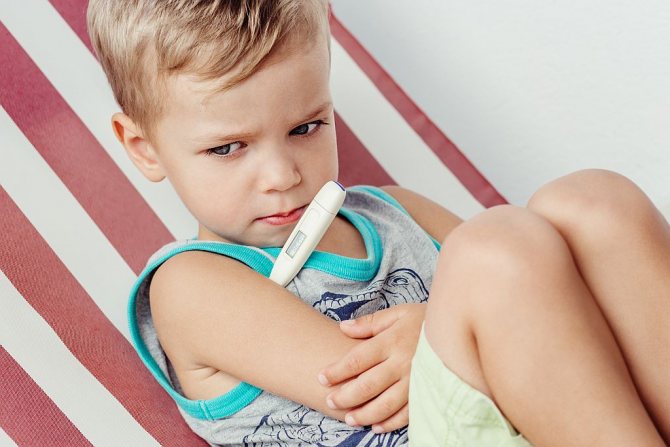
Consequences
Severe forms of intestinal infections in children, their untimely and improper treatment can lead to complications such as pulmonary edema, acute renal failure, acute heart failure, hypovolemic shock (a pathological condition caused by a rapid decrease in circulating blood volume), DIC syndrome (impaired blood to clotting) and infectious-toxic shock.
Treatment of intestinal infection in children
Treatment tactics depend on the type of disease and pathogens that led to the appearance of clinical signs. It is sometimes possible to distinguish a viral infection from a bacterial one by clinical manifestations. So, the first is more often accompanied by headache, muscle pain, weakness and fatigue, and the second is characterized by the appearance of blood in the stool.
What medications are prescribed?
Treatment of gastrointestinal tract infection largely depends on the severity of the clinical picture. Depending on the symptoms, antipyretic, antiemetic and antispasmodic drugs are used. To restore the normal functioning of the gastrointestinal tract, as well as to eliminate intoxication of the body, enterosorbents are prescribed. Also, the child may need medications to restore the body’s water balance, and to restore the intestinal microflora, medications containing bifidobacteria are selected. All medications must be prescribed to the child by a doctor.
What to do in severe cases
In severe forms of the disease and the development of complications, a specialist may recommend taking antibiotics. But such treatment is powerless against intestinal infections of a viral nature, because antibiotics do not act on viruses.
What to do if a child has an intestinal infection caused by viruses? Of course, choose an antiviral drug that will help cope with the disease.
Antiviral drugs for intestinal infections
Treatment of diseases caused by viruses requires an integrated approach: • rehydration (replenishment of lost fluid); • symptomatic (enterosorbents) therapy; • etiotropic (antiviral) therapy aimed directly at eliminating the cause of the disease; • first of all, it is necessary to select an antiviral drug that will immediately begin to fight the disease.
However, it must be remembered that in a patient with a viral intestinal infection, vomiting is a typical symptom, so tablet drugs may not always be suitable, as they may increase the urge to vomit. In addition, a child who does not feel well may simply refuse to take the pills. Moreover, the simultaneous use of tablets with enterosorbents, if the waiting time for their action is violated, can lead to the fact that not the entire dosage of the drug enters the body. Enterosorbents can “absorb” part of the tableted drug.
That is why many people use suppositories (suppositories) to treat viral intestinal infections. The suppository can be inserted quickly, easily and without any discomfort for the child. If there is vomiting, problems with the drug entering the body cannot arise. The speed of action of suppositories is also determined by the method of their administration. The rectum has a dense network of blood vessels, through which the drug is quickly absorbed into the blood and immediately begins to act.
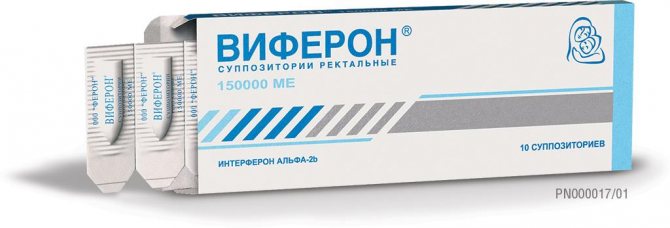
One of the antiviral drugs, which is available in the form of suppositories, is the drug VIFERON. It suppresses the activity of viruses and increases the effectiveness of the body's own immune response to pathogenic microorganisms.
Reception scheme
VIFERON is used for the treatment of enteroviral and adenoviral infections according to the following regimen: 1 suppository 2 times a day for 5 days, the dosage is selected depending on the age of the patient (150,000 IU and 500,000 IU) according to the instructions.
The drug VIFERON Suppositories acts carefully - it is allowed for children from the first days of life. The regimen of using the drug (2 times a day) is comfortable for both children and their parents.
Go to the official instructions page
Tablets for intestinal infections: basic drugs
To completely defeat not only the symptoms, but also the pathogens, it is recommended to take specialized medications. They will not only relieve discomfort and pain, but also prevent the cause of the disease. There are drugs with different principles of action, which include:
- Antiviral agents.
- Preparations against parasites.
- Antibiotics.
Medicines from the first group are prescribed when the cause of the disease is of viral origin. Patients receive treatment similar to treatment for a cold. The following drugs are considered popular: Amiksin, Arbidol, Anaferon, Rinikold and the like. If the infection is caused by parasites entering the body, treatment is based on taking special medications two or three times a day. Based on the tests, the doctor prescribes a remedy that fights a specific infectious agent. For example, to combat helminths it could be Vermox, Azinox and similar products.
Vermox
Antibiotics are aimed at removing harmful bacteria from the body in severe forms of intestinal infections. In order for a doctor to prescribe antibiotics, he must have tests on hand confirming that the disease has a bacterial source. Most often, Cefix, Levomycetin, and Amoxicillin are prescribed for the treatment of intestinal infections. For the treatment of young patients, antibiotics are offered in the form of syrups.
There are a lot of modern drugs that quickly alleviate intestinal infections.
Diarrhea tablets
As a rule, it is diarrhea that causes the greatest suffering for those suffering from an intestinal infection. At a minimum, the frequent urge to defecate does not allow you to lie down, which is necessary in a painful condition. At most, diarrhea prevents you from leaving the house to go to the pharmacy or see a doctor. There are a number of tablets that have proven themselves in the treatment of diarrhea caused by viral and infectious diseases.
Prevention of intestinal infections
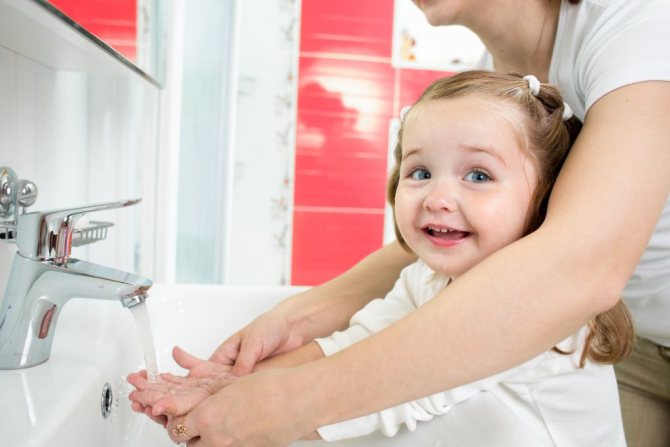
The World Health Organization reminds all parents of the ten “golden rules” for preventing intestinal infections in children. Here they are:
- Buy quality food products. Keep an eye on their expiration dates.
- Store food properly. Observe storage temperature conditions.
- Prepare your food properly. Follow the recommended heat treatment times.
- Consume food as soon as possible after preparation.
- Reheat pre-cooked food thoroughly. This is the best measure of protection against microorganisms that could multiply in food during storage.
- Avoid contact between raw and prepared foods.
- Wash your hands often and always before eating.
- Keep your kitchen clean. Don't use the same cutting board and knife for raw and cooked foods.
- Protect food from insects and rodents.
- Monitor the quality of the water you use and boil it if necessary.
Reference and information material
Author of the article
Belyaev Dmitry Alexandrovich
General doctor
Loading...
Take other surveys
Prevention of rotavirus infection
How not to get sick at sea? You should always wash your hands with soap before eating. If it is not possible to wash your hands, use wet antibacterial wipes or a liquid with antiseptic properties. You also need to wash your hands after using the toilet, contacting animals, and cutting raw food.
In the summer, do not snack on the street in dubious establishments, especially all kinds of meat pies, pasties, etc. If you buy ice cream and it has melted, you should not eat that either. Avoid milkshakes in hot weather.
When swimming in the sea, do not dive or swallow water, especially when the water temperature exceeds 25 degrees. Despite the salt, there are a lot of pathogenic microorganisms in the water. After swimming in the sea and playing in the sand, you should wash your hands and face with clean water (you can take it with you to the beach in a bottle).
Don't buy food on the beach, especially from vendors who walk along the shore with trays in the heat. It may be spoiled and it is unknown who, where and when prepared it. Eat fruits and vegetables in season and wash them thoroughly before eating.
It is advisable to eat food immediately after cooking. The longer it remains at room temperature (and in the summer the room temperature is quite high), the more microbes multiply in it. Put leftover food in the refrigerator, and when it’s time to eat, reheat it thoroughly.
Don't drink tap water, buy bottled water. Cook meat and fish at a temperature not lower than 70° C. The utensils used to cut them must be thoroughly washed and doused with boiling water. Frozen foods must be thawed thoroughly before cooking.
When cooked food cools to room temperature, microbes begin to multiply. The longer she remains in this condition, the greater the risk of getting food poisoning. To protect yourself, eat food immediately after cooking.
